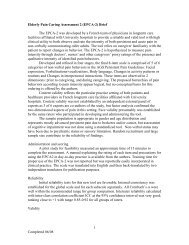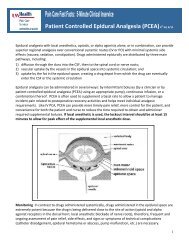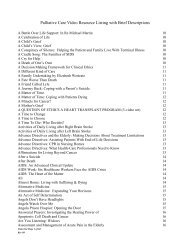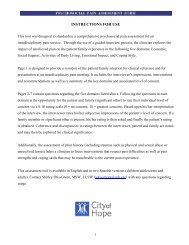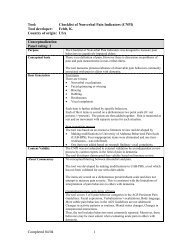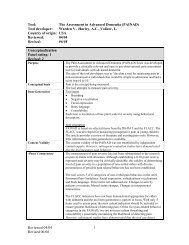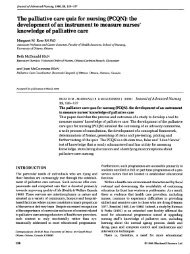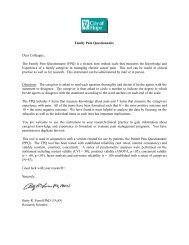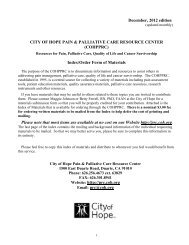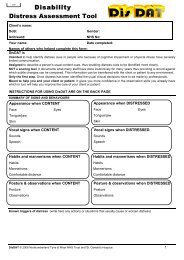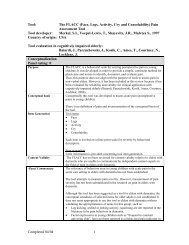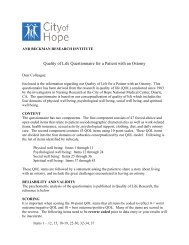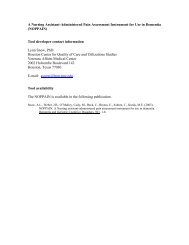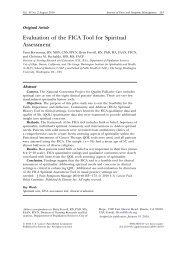Recommendations for Treating Constipation
Recommendations for Treating Constipation
Recommendations for Treating Constipation
Create successful ePaper yourself
Turn your PDF publications into a flip-book with our unique Google optimized e-Paper software.
Reducing Barriers to Pain and Fatigue ManagementReducing Barriers to Pain and Fatigue ManagementPreventing and Managing <strong>Constipation</strong>What to do:• Drinking lots of fluids is very important. Drink eight to ten cups ofliquid each day (if allowed by your doctor).• Try to eat at the same times each day.• Eat foods high in fiber (e.g. uncooked fruits (with the skin on),vegetables, whole grain breads and cereals, fresh raw fruits withskins and seeds).• Add one or two tablespoons of unprocessed bran to your food.This adds bulk and stimulates bowel movements. Sprinkle onfood at mealtimes.• Avoid foods and beverages that cause gas such as cabbage,broccoli, cauliflower, cucumbers, dried beans, peas, onions, andcarbonated drinks if these items cause you distress.• Get as much exercise as you can, even if that means onlywalking a very short distance.• Try to have a bowel movement whenever you have the urge.• Use stool softeners and laxatives only as instructed by yourdoctor or nurse.• Use a rectal suppository only after checking with your doctoror nurse.• If you are confined to bed, try to use the toilet or bedsidecommode when you have a bowel movement, even if that is theonly time you get out of bed.• Use an enema to provide immediate relief from constipation, butfirst check with the doctor or nurse. Enemas should be the laststep <strong>for</strong> relieving constipation. They evacuate the lower boweland help the upper bowel move as well.Do not:• Strain or use extreme <strong>for</strong>ce when trying to move your bowels• Use over-the-counter laxatives or enemas unless firstdiscussed with your doctor• Use laxatives and enemas if you have a low white blood count orlow platelet countFunded by NCIPreventing and Managing <strong>Constipation</strong>What to do:• Drinking lots of fluids is very important. Drink eight to ten cups ofliquid each day (if allowed by your doctor).• Try to eat at the same times each day.• Eat foods high in fiber (e.g. uncooked fruits (with the skin on),vegetables, whole grain breads and cereals, fresh raw fruits withskins and seeds).• Add one or two tablespoons of unprocessed bran to your food.This adds bulk and stimulates bowel movements. Sprinkle onfood at mealtimes.• Avoid foods and beverages that cause gas such as cabbage,broccoli, cauliflower, cucumbers, dried beans, peas, onions, andcarbonated drinks if these items cause you distress.• Get as much exercise as you can, even if that means onlywalking a very short distance.• Try to have a bowel movement whenever you have the urge.• Use stool softeners and laxatives only as instructed by yourdoctor or nurse.• Use a rectal suppository only after checking with your doctoror nurse.• If you are confined to bed, try to use the toilet or bedsidecommode when you have a bowel movement, even if that is theonly time you get out of bed.• Use an enema to provide immediate relief from constipation, butfirst check with the doctor or nurse. Enemas should be the laststep <strong>for</strong> relieving constipation. They evacuate the lower boweland help the upper bowel move as well.Do not:• Strain or use extreme <strong>for</strong>ce when trying to move your bowels• Use over-the-counter laxatives or enemas unless firstdiscussed with your doctor• Use laxatives and enemas if you have a low white blood count orlow platelet countFunded by NCI



